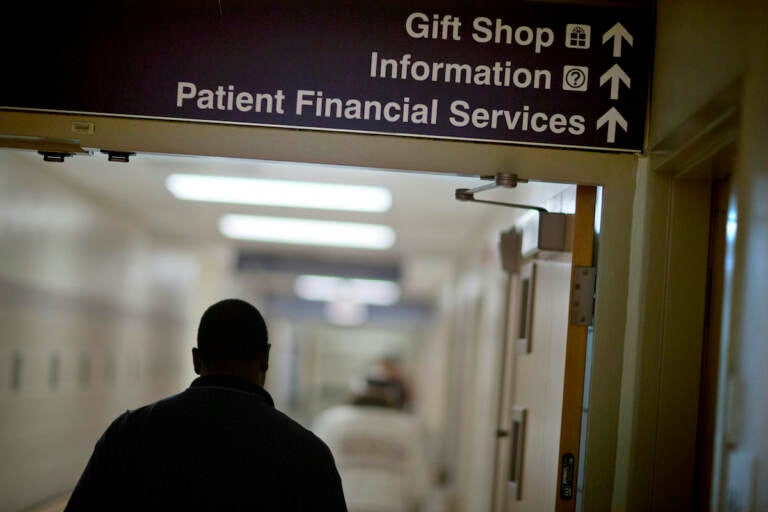A year after pandemic rules end, Pa.’s Medicaid program has dropped by 500,000 people
Last April, more than 3.7 million people were enrolled in Pennsylvania’s Medicaid program. It has dropped to 3.2 million since renewals restarted.
Listen 3:18
File photo: A sign points visitors toward the financial services department at a hospital. (AP Photo/David Goldman, File)
From Philly and the Pa. suburbs to South Jersey and Delaware, what would you like WHYY News to cover? Let us know!
During the height of the coronavirus pandemic, Raphaela Huff didn’t need to worry about retaining her Medicaid coverage.
A federal pandemic-era policy guaranteed continuous enrollment in Pennsylvania’s health insurance program for people with low income. Participants like her didn’t need to re-apply annually, and could stay enrolled even if they saw a change to their income.
But last April, Huff was among the state’s first cohort of people to go through Medicaid continuous enrollment “unwinding” — a phase in which states reinstated renewal requirements and eligibility reviews just before the end of the COVID public health emergency last spring.
It was a frustrating process for Huff.
“I almost gave up,” she said of her renewal application. “I was having problems getting the verification for something that [the state] wanted and I actually was like, OK, I’m just going to give up. I can probably get by without health care again, because I did in the past.’”
But it didn’t come to that. Huff got help from Put People First! PA, a grassroots health care advocacy group. She was able to keep her Medicaid, which she relied on during her pregnancy and the birth of her daughter last month. Others haven’t been so lucky, she said.
One year after the enrollment requirements were reinstated, Pennsylvania’s Medicaid program has dropped about half a million people, going from a record high of 3.7 million participants to 3.2 million as of February, according to state data.
Now, state and local officials are examining their efforts to keep people enrolled in health insurance during this transition phase as they make plans to improve the renewal process going forward.
‘You can make a mistake and it will cost you your health care’
State officials said they launched proactive outreach and awareness campaigns to prepare people for the reinstated renewal requirements by sending multiple messages through email, text and postal mail.
They wanted to limit the various kinds of challenges people could face when reapplying, officials said, especially for those who had never gone through a renewal process before.
“I think for any of us, the first time that you have to do something like that, that involves a bunch of paperwork and you weren’t anticipating it, it takes you a little bit by surprise,” said Pennsylvania Department of Human Services Secretary Dr. Valerie Arkoosh.
The state partnered with local governments and agencies, nonprofit organizations and community outreach workers to expand application assistance programs and support resources.
The goal was to keep as many people as possible covered with some form of health insurance, Arkoosh said.
Meanwhile, patient advocates worry about the true impact of going from continuous enrollment back to an annual enrollment process for health care access and uninsured rates, which has yet to be determined.
“It seems like luck is a huge part of it,” Huff said. “You can make a mistake and it will cost you your health care. And they [the state] can make a mistake and it will cost you your health care. But it’s always we’re punished, the ones that are trying to apply.”
A majority of people enrolled in Medicaid have been re-approved for coverage, state data shows. Another 510,000 people became newly eligible and enrolled in the safety net insurance program, also called Pennsylvania Medical Assistance, during this period.
Of those who were cut from the program, about 306,618 people were deemed ineligible. If their income exceeded the program’s limits, they were referred to health plans on Pennie, the state’s Affordable Care Act marketplace.
An estimated 75,000 people were able to obtain ACA health insurance after losing Medicaid through that partnership, Arkoosh said.
“This is just a perfect example of our goal of having people stay covered,” she said. “For many of those individuals, if they’re just over that income limit to qualify for Medicaid, they’re getting plans for $5 a month, $10 a month [on Pennie].”
Others were cut from the state’s Medicaid rolls if they had moved out of state or obtained health insurance through an employer.
But another 237,455 people lost their Medicaid coverage because of missing renewal paperwork and documentation, even if they were eligible by income.
Attorney Maripat Pileggi of Philadelphia’s Community Legal Services successfully helped many of her clients quickly appeal these terminations.
“That’s what makes them in a lot of ways the most frustrating,” Pileggi said. “Because it was really just a missing piece of paper that, if it could have been caught at the beginning of this process, then our client never would have lost Medicaid and would have had continuous access to health care.”
Even when people submitted all their required paperwork on time, Pileggi said administrative errors occurred at county assistance offices, which help process the state’s Medicaid applications.
This was and is especially true, Pileggi said, at offices that are understaffed and under-resourced like in Philadelphia. Something as simple as a misplaced piece of paper from someone’s renewal application put that person in jeopardy of losing their coverage, she said.
The future of Medicaid renewals in Pa.
Pennsylvania is currently processing renewal applications from March. That data is not yet reflected in state reports.
Arkoosh said the state aims to finish the one-year unwinding phase by the end of June. That includes processing appeals from recent termination decisions and an outstanding 177,830 renewal cases from previous months that have not been reviewed as of February.
State officials say they want to make the renewal process easier for people going forward. One way they plan on doing that is by expanding a process called ex-parte, which is when state and local agencies use information already on file to renew someone’s Medicaid coverage, thereby reducing the amount of paperwork people must submit.
“You can avoid a heck of a lot of hassle for both staff and our clients if you’re able to process renewals without requesting additional information,” said Hoa Pham, deputy secretary of the state Office of Income Maintenance. “We’re definitely looking forward to bringing to resolution some additional strategies to improve our processes on our end as well.”
WHYY is your source for fact-based, in-depth journalism and information. As a nonprofit organization, we rely on financial support from readers like you. Please give today.






